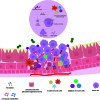The role of microbiota in tumorigenesis, progression and treatment of bladder cancer
- PMID: 38455086
- PMCID: PMC10917617
- DOI: 10.20517/mrr.2023.47
The role of microbiota in tumorigenesis, progression and treatment of bladder cancer
Abstract
For decades, the urinary system was regarded as a sterile environment due to the absence of any bacterial growth in clinical standard urine cultures from healthy individuals. However, a diverse array of microbes colonizes the urinary system in small quantities, exhibiting a variable compositional signature influenced by differences in sex, age, and pathological state. Increasing pieces of evidence suggest microbiota exists in tumor tissue and plays a crucial role in tumor microenvironment based on research in multiple cancer models. Current studies about microbiota and bladder cancer have preliminarily characterized the bladder cancer-related microbiota, but how the microbiota influences the biological behavior of bladder cancer remains unclarified. This review summarizes the characteristics of microbiota in bladder cancer, aims to propose possible mechanisms that microbiota acts in tumorigenesis and progression of bladder cancer based on advances in gut microbiota, and discusses the potential clinical application of microbiota in bladder cancer.
Keywords: Microbiota; bladder cancer; mechanism; microbial metabolites; tumor microenvironment.
© The Author(s) 2023.
Conflict of interest statement
All authors declared that there are no conflicts of interest.
Figures


References
Publication types
LinkOut - more resources
Full Text Sources
